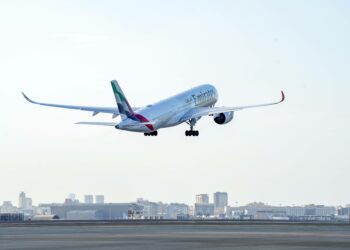Hotel News Middle East speaks to a number of industry leaders about the emergence of sustainable travel
 The importance of sustainable travel has never been more prevalent than it is now. It’s nothing new but now it is clear to see that hotels, along with the entire tourism industry, are paying attention like never before and there’s good reason for that.
The importance of sustainable travel has never been more prevalent than it is now. It’s nothing new but now it is clear to see that hotels, along with the entire tourism industry, are paying attention like never before and there’s good reason for that.
Sustainable tourism is such a hot-topic, at the minute, that the key Dubai-based trade show Arabian Travel Market has decided to make it the theme of their event at Dubai World Trade Centre next year.
“The hotel industry is taking sustainability very seriously. In the UAE alone, a total of 70 properties are certified as environmentally conscious and compliant by three globally recognised bodies, Green Globe, Green Key and Earth Check,” says Simon Press, enior exhibition director, ATM.
“There is also a growing trend of hotels implementing carbon offsetting programmes where guests are invited to make a donation at the end of their stay and this is then given to an environmental project chosen by the hotel. Of course, that is on top of day-to-day activities, employing reduce, reuse and recycle policies.”
Satish Patil, director of engineering, Fairmont Dubai, says sustainable tourism in the hotel industry means considering three key elements: the guest experience, the local communities, and the surrounding nature.
“Whilst the idea of sustainable travel is becoming increasingly popular, the hotel industry embraces sustainability in its business plan by striving to enhance green guidelines and initiatives to increase the overall industry awareness,” says Patil.
There are a number of challenges ahead,though, if the hotel industry is serious about embracing sustainable travel.
“The GCC is one of the fastest growing regional hospitality markets in the world. It is also labour intensive and by sheer virtue of transporting and accommodating tourists, it has a major carbon footprint,” says Press.
“Its impact on the environment is multi-dimensional, ranging from CO2 emissions, water and energy demand, food waste, noise and light pollution. Sustainable travel in the Middle East requires the buy-in from all stakeholders – hoteliers, operators, local communities, governments, tourist boards and tourists.”
Sustainable travel in the Middle East faces different challenges than anywhere else in the world – says Patil.
“One of the key challenges is the region’s hot and arid climate, as the cities require great energy supplies to keep the buildings habitable,” Patil says.
One area hoteliers need to start addressing is in regards water consumption, says Haitham Mattar, CEO, Ras Al Khaimah Tourism Development Authority (RAKTDA).
“International studies show that tourists use more water than residents in the destination they visit,” he says.
Operating in Dubai provides unique challenges as Caroline Rowe, director of marketing and communication at Media One Hotel explains.
“Dubai specifically obviously has to import a lot of food products which gives each food dish that extra carbon footprint,” says Rowe.
“Here at Media One we try and source locally and try to use sustainably farmed products or even herbs and plants which are grown in our own garden in Garden on 8.”
Mohamed Awadalla, CEO Time Hotels says: “From our experience the main challenge is the general lack of awareness prevalent from hotels and right through the supply chain.
“However, tourists and travellers are becoming more and more aware of the carbon footprint they are leaving on their travels and, as a result, the hospitality industry has had to look at how sustainability and a credible social conscience must drive business strategy.”
It’s all very well identifying what the challenges are, but it means nothing if a successful system is not implemented. However, as Press explains, there are already many tangible examples of sustainable travel in action.
“One example is the proposed Hotel Indigo in Dubai Sustainable City, which will use solar power for all its energy needs and recycle all waste water and waste generated,” says Press.
“In terms of transportation, more and more countries are looking towards electric/hybrid vehicles and Tesla charging stations are becoming more prevalent outside hotels. While manufacturers have adapted the fuselage and engine design on airplanes, making them more fuel efficient.”
Patil says: “Being part of the AccorHotels Planet 21 sustainability programme, Fairmont Dubai has also executed various steps to reduce the carbon footprint emission.
“Implementations from water savers on shower heads and taps, from LED lighting to recycled waste are only some of the examples, implemented at Fairmont Dubai.”
Mattar says : “We have been collaborating with Ras Al Khaimah Waste Management Authority (WMA) to launch new waste management standards for hotel and tourism establishments across the emirate.
“Over the past 12 months we have guided hotels and tourism establishments through the updated mandatory standards with of recycling 75 per cent of their waste by 2021.”
Rowe is very clear about the work that Media One Hotel is undertaking when it comes to sustainable tourism.
“Through our partnership with EWS-WWF and our own research we have started to investigate whether we can be more sustainable by using recyclable glass containers instead of plastic bottles – we will be investigating this in coming months as a pilot program which is just one step towards sustainability,” says Row.
“We have also been part of a project with EWS-WWF and DTCM where we hosted and took part in the trials of a board game which allowed staff members to learn more about sustainability and power usage.”
It’s not uncommon for people to be cynical when it comes to the environment but, as Press explains, there is little option but to accept that sustainable travel is a necessity.
Press says: “The nature of the beast is that it is impossible for someone to travel and spend time in another country or destination without leaving a carbon footprint.
“Hotels that are able to reduce energy and water consumption do not only help the community and environment, but can also benefit from cost savings in the long run. Energy costs in UAE hotels represent approximately 6% of total hotel revenues, hence even small savings could have significant positive financial benefits.”
Patil believes it is possible to fully integrate sustainable travel as long as the right criteria is met.
“If all hotels would engage their guests to embrace sustainability by experiencing the location through its cuisine, tradition and daily life, such as nature walks, village tours, mountain biking and cookery classes, the sustainable travel can easily be implemented across the hospitality industry,” he says.
Awadalla says: “This is not impossible although it requires commitment from all stakeholders.
“We are very fortunate here as both DTCM and the Dubai Government are very strong proponents of sustainability, borne out in particular through plans to become the most sustainable city in the world by 2021.”
Mattar says: “It is vital that we work hand-in-hand with our travel and tourism stakeholders for the greater good of the community in which we operate.
“Through successful collaboration we are able to stimulate sustainable job growth, increase the industry’s financial contribution to the economy, and support a growing number of travellers that visit Ras Al Khaimah year-on-year.”
Press is full of praise for how the hotel industry in the region has embraced change.
“Professionals in the hospitality industry realise that today’s travelers, particularly those from Generation Y, are more environmentally focused and conscious of the carbon footprint they are leaving behind,” he says.
“Finally, hoteliers know that making their operation as sustainable as possible is the right thing to do, for the environment and future generations.”
There are a number of activities, according to Patil, such as traditional desert safaris, hiking and camping, scuba and snorkelling trips, and bird-watching adventures that are helping to implement sustainable travel.
Hoteliers are strongly embracing this initiative and they have to, says Awadalla.
“It will be a mandatory requirement for every business to operate in a sustainable fashion in the future,” he says.
“We have already seen a study reveal travelers would spend, on average, an additional $20 per night to stay in an environmentally conscious hotel, while we have witnessed certain business partners will only work now with a hotel that is globally certified in sustainability.”
The question has to be asked, how high on guests’ agenda is sustainable travel – do they really care?
“The Media One type of guest does. The Media One type of guest is generally quite socially plugged – aware of issues, up to date with the media and with a global outlook and lifestyle,” says Rowe.
“For our guests, it matters that we say something and we do what we say we are going to do, not just for the sake of lip service.”
There is no question, claims Mattar, that the tide is turning when it comes to sustainable travel.
“Traveller demands are continually changing and we are seeing a growing demand for sustainable tourism products and services.
“While a number of hotels present in Ras Al Khaimah already implement their own sustainable and CSR initiatives across their properties, it is interesting to see booking trends following this route.”



































































